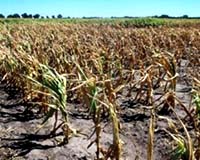 |
Atlanta GA (SPX) Oct 26, 2009 Did you know that millions of tons of fruits and vegetables in the United States end up in the trash can before being eaten, according to the U.S. Department of Agriculture? A Georgia State University professor has developed an innovative new way to keep produce and flowers fresh for longer periods of time. Microbiologist George Pierce's method uses a naturally occurring microorganism - no larger than the width of a human hair - to induce enzymes that extend the ripening time of fruits and vegetables, and keeps the blooms of flowers fresh. The process does not involve genetic engineering or pathogens, but involves microorganisms known to be associated with plants, and are considered to be helpful and beneficial to them. "These beneficial soil microorganisms serve essentially the same function as eating yogurt as a probiotic to have beneficial organisms living in the gastrointestinal system," Pierce said. The process works by manipulating the organism's diet so that it will over express certain enzymes and activities that work in the ripening process and keeping the flower blooms fresh. Pierce analogizes this to using diet and exercise to improve the performance of an athlete. "We change the diet of the organism, and we can change its performance," Pierce said. "It's no different than taking a good athlete and putting them on a diet and exercise regime, and turning him or her into a world-class athlete." In a very simple sense, climacteric plants - such as apples, bananas, peaches and tomatoes - respond to climactic change, and when they do, they produce increased levels of signal compounds like ethylene. For fruit such as peaches, ethylene causes the peach to ripen, increases aroma chemicals, but unfortunately, makes the peach very fragile. "If you've seen ripe peaches, they will simply fall apart," Pierce said. "It will lose 90 percent of its ability to resist pressure, which means that if a peach responds normally to ethylene, it is subject to bruising when you ship it." The enzymes produced from Pierce's new method reduce the response to signal compounds so that it takes a longer period of time for fruits to ripen, doubling the time it takes for ripening. The catalyst in this process can be distributed through various formulations and configurations. These include being incorporated into shipping boxes, packing materials or used to treat the air of shipping containers. It could be used either with individual fruits or vegetables or for larger, bulk quantities. This new process could have a big impact on preventing waste, improving the consumption of healthy fruits and vegetables, allowing companies to ship produce longer distances. "Who hasn't bought fruit or vegetables and then thrown them away?" Pierce said. "Most people will buy more, and consume more, if they know that they could have a better quality of produce for longer." Pierce said. The method also will allow for the storage of fruits, vegetables and flowers at room temperatures rather than refrigeration, thus helping to save energy, Pierce said. Share This Article With Planet Earth
Related Links Georgia State University Farming Today - Suppliers and Technology
 Protein helps plants survive drought
Protein helps plants survive droughtLa Jolla, Calif. (UPI) Oct 23, 2009 A hormone-sensing protein that helps plants survive dry spells and drought could yield clues to improve crops worldwide, scientists in La Jolla, Calif., said. When a drought-tolerant plant detects dry conditions, a plant protein called PYR1 synthesizes a hormone knows as abscisic acid, scientists at the Scripps Research Institute said. Plants under the influence of the hormone be ... read more |
|
| The content herein, unless otherwise known to be public domain, are Copyright 1995-2009 - SpaceDaily. AFP and UPI Wire Stories are copyright Agence France-Presse and United Press International. ESA Portal Reports are copyright European Space Agency. All NASA sourced material is public domain. Additional copyrights may apply in whole or part to other bona fide parties. Advertising does not imply endorsement,agreement or approval of any opinions, statements or information provided by SpaceDaily on any Web page published or hosted by SpaceDaily. Privacy Statement |